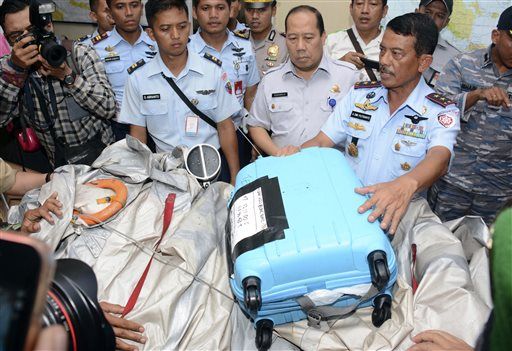Pangkalan bun, Dec 31: A massive hunt for the 162 victims of AirAsia Flight 8501 resumed in the Java Sea on Wednesday. The search will focus on the area of the aqua-colored waters where the first bodies and debris were located a day earlier. But wind, strong currents and high surf hampered recovery efforts as distraught family members anxiously waited to identify their loved ones.

The first proof of the jet's fate emerged on Tuesday in an area not far from where it dropped off radar screens. Searchers found as many as six bodies and debris that included a life jacket, an emergency exit door and a suitcase about 10 miles from the plane's last known coordinates.
The airliner's disappearance halfway through a two-hour flight between Surabaya, Indonesia, and Singapore triggered an international search for the aircraft involving dozens of planes, ships and helicopters. It is still unclear what brought the plane down.
The plane needs to be located and its cockpit voice and flight data recorders, or black boxes, recovered before officials can start determining what caused the crash.
Images of the debris and a bloated body shown on Indonesian television sent a spasm of anguish through the room at the Surabaya airport where relatives awaited news.
The first sign of the jet turned up about 10 miles (16 kilometres) from its last known coordinates. Parts of the interior, including the oxygen tank, were brought to the nearest town, Pangkalan Bun. Another find included a bright blue plastic suitcase, completely unscratched.
“I know the plane has crashed, but I cannot believe my brother and his family are dead,” said Ifan Joko, who lost seven family members, three of them children, as they travelled to Singapore to ring in the new year. “We still pray they are alive.”
First Adm. Sigit Setiayanta, commander of the Naval Aviation Centre at Surabaya Air Force base, told reporters six corpses were spotted about 160 kilometres (100 miles) from Central Kalimantan province.
Rescue workers descended on ropes from a hovering helicopter to retrieve bodies. Efforts were hindered by 2-meter (6-foot) waves and strong winds, National Search and Rescue Director SB Supriyadi said.
The first body was later picked up by a navy ship. Officials said as many as six others followed, but they disagreed about the exact number.
Mr. Supriyadi was on the aircraft and saw what appeared to be more wreckage under the water, which was clear and a relatively shallow 20 to 30 meters (65 to 100 feet).
When TV broadcast an image of a half-naked man floating in the water, a shirt partially covering his head, many of the family members screamed and wailed uncontrollably. One middle-aged man collapsed and had to be carried out on a stretcher.
Their horror was captured by cameras on the other side of windows into the waiting room. Officials later blacked out the glass.
About 125 family members were planning to travel on Wednesday to Pangkalan Bun to start identifying their loved ones. Body bags and coffins have been prepared at three hospitals there. Dozens of elite military divers also joined the search.
Malaysia-based AirAsia's loss comes on top of the still-unsolved disappearance of Malaysia Airlines Flight 370 in March with 239 people aboard, and the downing of Malaysia Airlines Flight 17 in July over Ukraine, which killed all 298 passengers and crew.
Nearly all the passengers and crew were Indonesians, who are frequent visitors to Singapore, particularly on holidays.
AirAsia group CEO Tony Fernandes, the airline's founder and public face and a constant presence in Indonesia since the tragedy started unfolding, said he planned to travel to the recovery site on Wednesday.
“I have apologised profusely for what they are going through,” he said of his contact with relatives. “I am the leader of this company, and I have to take responsibility. That is why I'm here. I'm not running away from my obligations.”
The jet's last communication indicated the pilots were worried about bad weather. They sought permission to climb above threatening clouds but were denied because of heavy air traffic. Four minutes later, the jet disappeared from the radar without issuing a distress signal.
Several countries rushed to Indonesia to help with search and recovery efforts.
The United States said it was sending the USS Sampson destroyer, joining at least 30 ships, 15 aircraft and seven helicopters in the search for the jet.
A Chinese frigate was on the way. Singapore said it was sending two underwater beacon detectors to try to pick up pings from the plane's all-important cockpit voice and flight-data recorders. Malaysia, Australia and Thailand are also involved in the search.





Comments
Add new comment